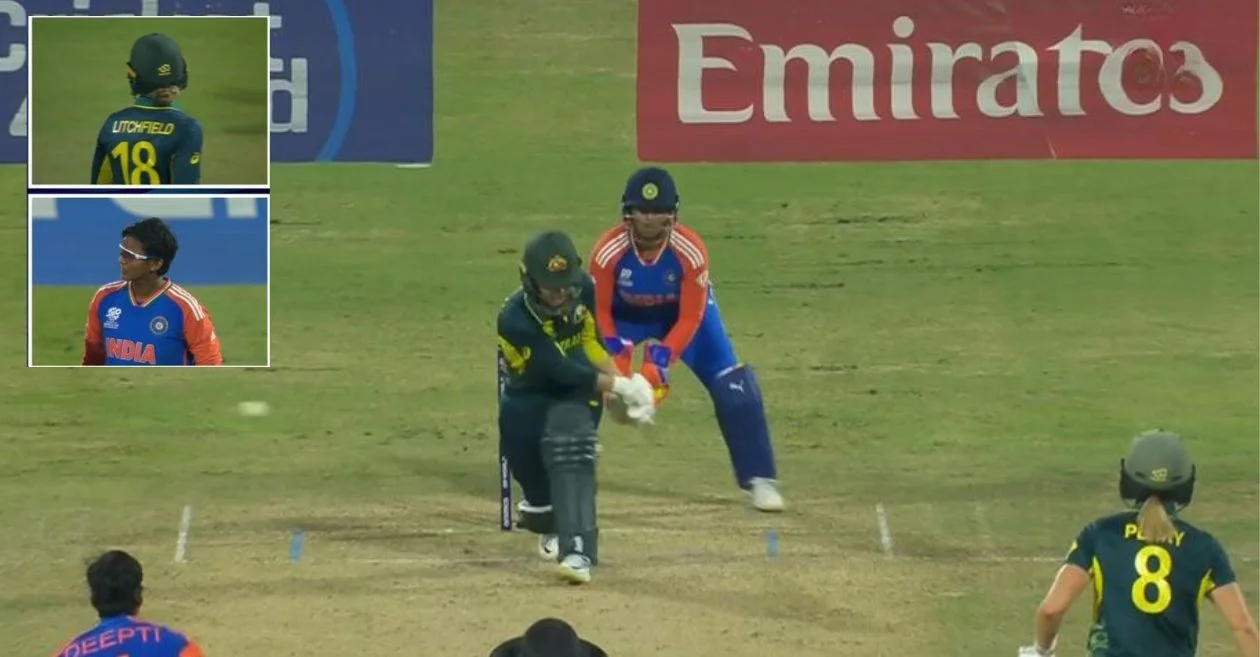Table of Contents
In an unusual incident during India’s Women’s T20 World Cup 2024 match against Australia in Sharjah on Sunday (October 13), Phoebe Litchfield was controversially ruled not out despite being trapped on the pads while attempting a switch hit.
Controversial lbw incident: Phoebe Litchfield’s survives
The incident unfolded in the 17th over of the game, with India’s Deepti Sharma bowling. After the first ball was hit for a boundary, Deepti tossed up a delivery, aiming to spin it away from Litchfield. The ball hit Litchfield’s pads after her reverse-sweep attempt failed, and the on-field umpire raised her finger. However, Litchfield reviewed the decision, leading to an unusual sequence where the third umpire’s ruling reversed the initial out decision, claiming the ball had pitched outside leg-stump.
Confusion over law interpretation
What made this decision more contentious was the application of the Hawk-Eye technology, which showed the ball pitching outside leg stump. Typically, in such cases where the batter switches their stance, the leg-side is considered the off-side for LBW calculations. Nevertheless, since Litchfield did not premeditate her switch before the ball’s release, the rules still considered her as a left-handed batter. Vice-captain Smriti Mandhana expressed her frustration to the on-field umpire, arguing that Litchfield’s switch should have redefined her stance as a right-handed batter for that delivery.
Given out LBW. Phoebe Litchfield takes the review. No bat or glove. Pitching outside the leg stump and Phoebe Litchfield survives. Smriti tells umpire Sue Redfern that Phoebe Litchfield was turning around as a right hander.#INDvsAUS #INDvBAN #INDvAUS pic.twitter.com/eGbvEZNC4j
— A & K🇮🇳 (@badjocker1020) October 13, 2024
MCC laws clarify the outcome
According to Law 36.1.2 of the Marylebone Cricket Club (MCC), a batter can only be declared leg-before-wicket if the ball pitches between the wickets or on the off-side of the striker’s wicket. Law 36.3 further clarifies that the off-side is determined by the batter’s stance at the moment the ball is released. As Litchfield had not fully committed to her reverse sweep before the delivery, the laws technically protected her, allowing her to continue despite the initial LBW decision.
“The off side of the striker’s wicket shall be determined by the striker’s batting position at the moment the ball comes into play for that delivery,” the law reads.
MCC : 36.3 Off side of wicket law saved Phoebe Litchfield
The off side of the striker’s wicket shall be determined by the striker’s batting position at the moment the ball comes into play for that delivery.#INDvAUS #T20WorldCup @MCCOfficial pic.twitter.com/rLFYN0TqUd
— Pushkar Pushp (@ppushp7) October 13, 2024
Also WATCH: Katherine Fraser survives as bails don’t come off after Nat Sciver-Brunt’s delivery hit stumps in Women T20 World Cup 2024
Litchfield’s brief but impactful innings for Australia
After surviving the LBW scare, Litchfield went on to score 15 runs off just 9 balls, which included a notable six over mid-wicket off Shreyanka Patil. Her quick cameo boosted Australia’s total as they posted 151/8, with Grace Harris top-scoring with 40 runs. Tahlia McGrath and Ellyse Perry also contributed valuable runs, scoring 32 each. For India, Renuka Singh and Deepti Sharma were the standout bowlers, both claiming two wickets.
India’s chase falls short in Women’s T20 World Cup 2024
In response, India’s chase started on the back foot as opener Mandhana fell early. Nonetheless, Shafali Verma tried to capitalize on the powerplay, scoring 20 runs from 13 balls with two fours and a six. Captain Harmanpreet Kaur fought hard, remaining unbeaten with 54 runs off 47 balls, but lacked support from her teammates. Deepti was the only other batter to offer resistance, scoring 29 runs. Together, Harmanpreet and Deepti added 63 runs for the fourth wicket, but after their partnership ended, the rest of the batting lineup crumbled. India finished at 142/9 in their 20 overs, falling 9 runs short of the target, and Australia registered a hard-fought victory.
